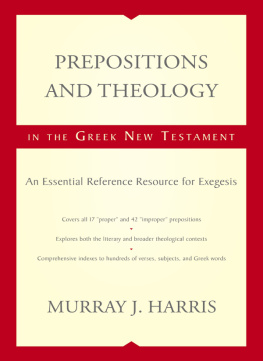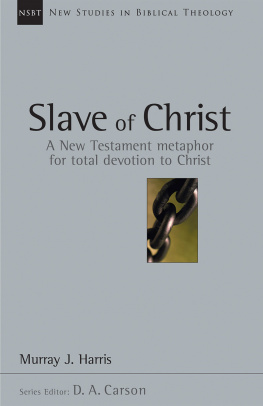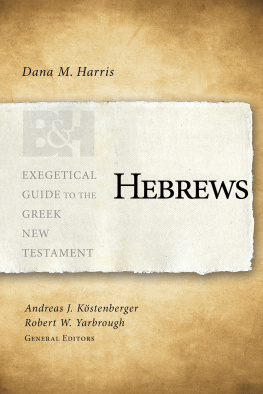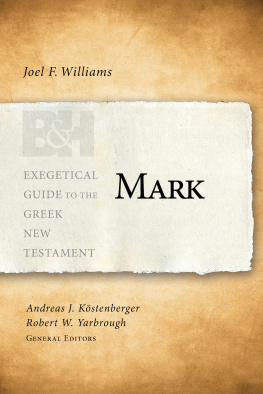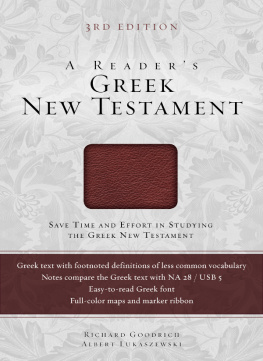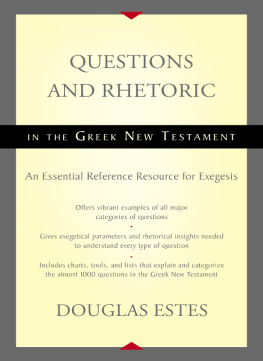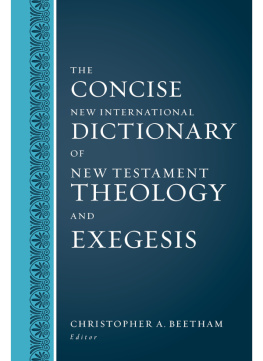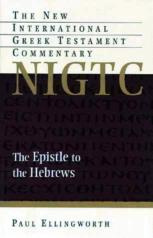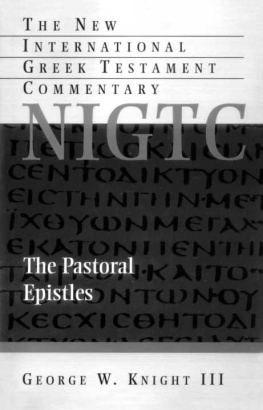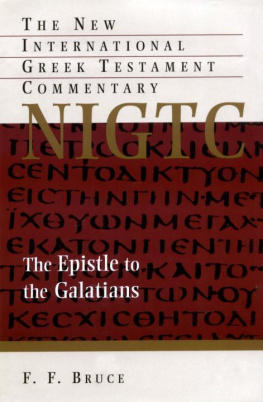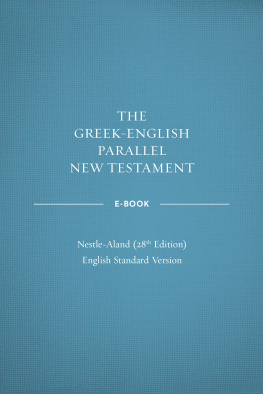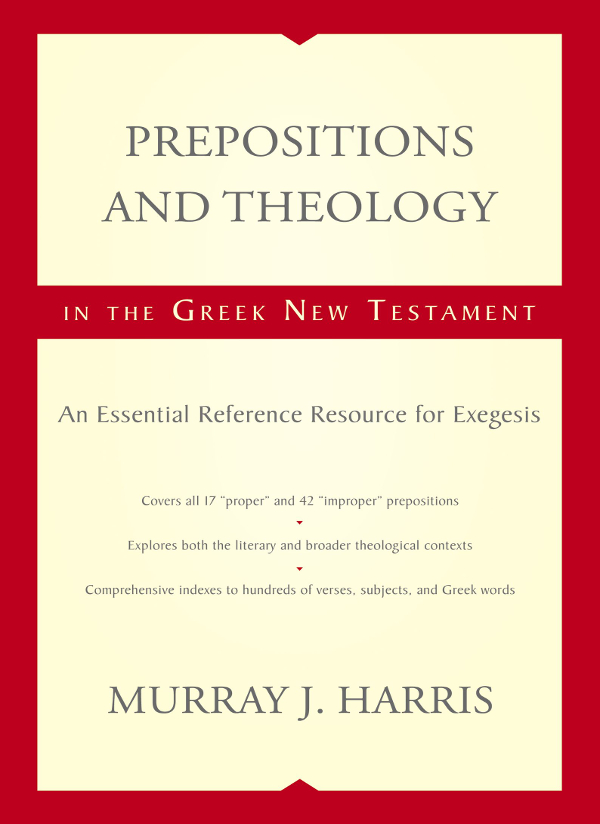ZONDERVAN
Prepositions and Theology in the Greek New Testament
Copyright 2012 by Murray J. Harris
Requests for information should be addressed to:
Zondervan, 3900 Sparks Dr. SE, Grand Rapids, Michigan 49546
ePub Edition April 2017: 978-0-310-53105-0
Library of Congress Cataloging-in-Publication Data
Harris, Murray J.
Prepositions and theology in the Greek New Testament / Murray J. Harris.
p. cm.
Includes .
ISBN 978-0-310-49392-1 (hardcover)
1. Greek language, BiblicalPrepositions. 2. Bible. N.T.Language, style. I. Title.
PA849.H37 2011
487.4dc23
2011046973
All Scripture translations in the book, unless otherwise noted, are the authors own, based on the Greek New Testament text or the Septuagint.
Any Internet addresses (websites, blogs, etc.) and telephone numbers in this book are offered as a resource. They are not intended in any way to be or imply an endorsement by Zondervan, nor does Zondervan vouch for the content of these sites and numbers for the life of this book.
All rights reserved. No part of this publication may be reproduced, stored in a retrieval system, or transmitted in any form or by any meanselectronic, mechanical, photocopy, recording, or any otherexcept for brief quotations in printed reviews, without the prior permission of the publisher.
Cover design: Tammy Johnson
Information about External Hyperlinks in this ebook
Please note that footnotes in this ebook may contain hyperlinks to external websites as part of bibliographic citations. These hyperlinks have not been activated by the publisher, who cannot verify the accuracy of these links beyond the date of publication.
To Bruce and Don,
who both blazed a shining trail
in academic pursuits
for their youngest brother to follow
Contents
T he present work is not a comprehensive treatment of prepositions in the Greek New Testament. For that the reader may consult the larger grammars such as , or other specialized works such as P. F. Regards Contribution ltude des prpositions dans la langue du Nouveau Testament. Even less does it seek to relate the New Testament use of prepositions to earlier or later usage in the Greek language, although occasional references are made to Classical Greek and Modern Greek. For an examination of Greek Prepositions from Antiquity to the Present, we now have the recent magisterial work of that title by Pietro Bortone (Oxford: Oxford University Press, 2010). Nor does this book purport to be a theology of the prepositions, as if prepositions in themselves can express theology. Rather, this is a study of numerous places in the Greek New Testament where prepositions contribute significantly to the theological meaning of the text. Prepositions in themselves do not carry theological meaning, but the way they are used invests them with theological import. Naturally the choice of examples is somewhat arbitrary and simply reflects the authors own theological interests and sensitivities.
What is offered here is similar in approach to the authors earlier work in a lengthy appendix in volume 3 of The New International Dictionary of New Testament Theology, edited by C. Brown (Exeter: Paternoster/Grand Rapids: Zondervan, 1978). But the present contribution differs from that earlier treatment in several important ways.
- 1. All of the 17 New Testament proper prepositions are dealt with.
- 2. There are many more verses of significance discussed under each of these prepositions.
- 3. There is a discussion of key repeated phrases that use a particular preposition.
- 4. All 42 improper prepositions are briefly treated, with a detailed consideration of seven theologically significant occurrences.
- 5. A classification of the use of prepositions in compound words is 574).
- 6. The layout is more user-friendly and a Greek font is used.
When single verses are discussed seriatim, as in this work, there is the constant danger that the context may be overlooked. But the reader should find that appropriate attention has been given to the immediate literary context and the wider linguistic and theological context of a particular verse. Turner comments that in the Koine all the prepositions become increasingly elastic and their sense has to be determined more often by the context than was earlier the case (261). See, for example, my discussion of in John 1:1 or of in Hebrews 12:2.
I have long believedand taughtthat there are four areas of Greek grammar that produce the most handsome dividends when special attention is given to understanding them. These Big Four are the aorist, the genitive case, the article, and prepositions. Of prepositions it has been rightly said, An in-depth knowledge of a language is not attained until one has total mastery of its prepositional system.
Basically, a preposition is a wordusually a small word in most languagesthat expresses a relationship between other words. In Greek that relationship may be as wide-ranging as purpose or result, cause or basis, concern or benefit, derivation or separation, identification or distinction, instrumentality or agency, correspondence or equivalence, representation or substitution, circumstances or sphere, incorporation or fellowship, priority or posteriority. So the significance of prepositions is immediately apparent. One is reminded of the vivid picture drawn in Jas 3:4 to illustrate the potent influence of the tongue, that ships, though massive in size, are steered by a very small rudder ( ). The sentence is the , the preposition is often the . As for prepositional influence on a vastly wider scale, the Danish linguist V. R. Brndal believes that Greek prepositions were decisive in the development of Western philosophy, which was based on Greek and on the nuances expressed by these prepositions.
To avoid a volume of inordinate length, I have resisted the temptation to supply references to sources that support the various views mentioned. Where given, documentation is generally within the text and restricted to grammars, lexicons, and English versions. For some readers it may prove refreshing to have so few footnotes! References to ) or includes additional relevant material.
This volume is offered to the reader in the hope that it may encourage close study of the Greek text of the New Testament, since interpreting the text grammaticallyincluding giving attention to the nuances of prepositionsis the necessary prelude to understanding it theologically.
I am grateful to Dr. Stanley N. Gundry, Executive Vice President and Editor-in-Chief at Zondervan, for his ready acceptance of this manuscript for publication, and to Dr. Verlyn D. Verbrugge, Senior Editor-at-Large for Biblical and Theological Resources at Zondervan, for his skill and efficiency in guiding the book through publication.
With warm gratitude I wish to acknowledge three persons who have inspired me in my academic life. First, Jennifer, my wife of fifty years, who has constantly supported and encouraged me, latterly in the midst of her debilitating chronic multiple sclerosis. Then Bruce, my eldest brother, a Rhodes Scholar who studied classics at Balliol College, the University of Oxford, and finally served as Head of the School of History, Philosophy and Politics at Macquarie University in Sydney. And Don, an older brother, the Vinerian Scholar in law at Oxford, cofounder and formerly Director of the Centre for Socio-Legal Studies of the University of Oxford, and Emeritus Fellow of Balliol College.

